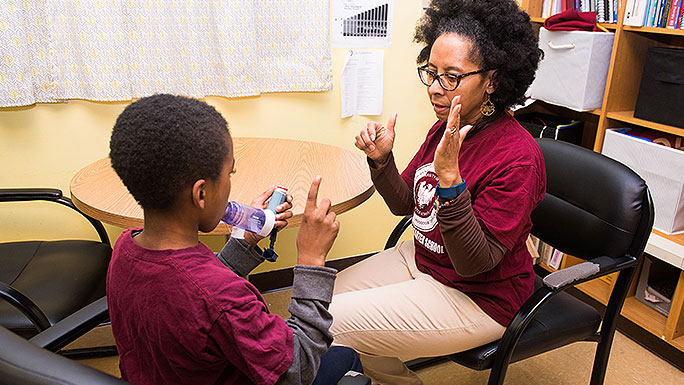Urban Health Initiative (UHI)

The Urban Health Initiative (UHI) is the University of Chicago Medicine’s community health department, which administers our population health and community benefit programs. This is accomplished through collaboration with community programs and partners, innovative strategies and the utilization of resources. UHI fosters strong, lasting relationships with civic leaders, community organizations, health care providers and residents to strategically improve health and access to quality care on the South Side of Chicago.
Population Health:
Health outcomes of a group of individuals, including the distribution of such outcomes within the group
Programs & Partners in Community Health Innovation
The Center for Community Health and Vitality (CCHV) uses a systematic approach to address individual and community health needs through academic partnerships, relationship-building and community grand rounds. We recognize good health is not merely the absence of disease, it also fosters vitality — the capacity to live and develop.
Originally conceived by former first lady Michelle Obama during her tenure as vice president of community affairs at UChicago Medicine, the CCHV develops programs and activities that address health concerns identified by the community, including:
- Education and research programs
- Workforce development and career training
- Violence prevention initiatives
- Capacity-building for community organizations
- Wellness programs
- Employment and economic development opportunities
The CCHV creates and sustains collaborative relationships between UChicago Medicine and South Side communities, forming partnerships to address medical and social issues that threaten health and vitality. We connect community residents, organizations and institutions with University physicians, professors, and staff to identify opportunities to effectively address these concerns in our neighborhoods.
Through this partnership with one of the nation’s largest community health systems, UChicago Medicine faculty provide a variety of specialty care services at the ACCESS Grand Boulevard Health and Specialty Center on the South Side of Chicago.
The Extension for Community Healthcare Outcomes (ECHO-Chicago) is an innovative model to train community-based providers to deliver state-of-the-art care for common, chronic diseases in vulnerable, underserved communities. ECHO-Chicago is built on the premise that:
- Technology can be used to leverage scarce resources.
- Case-based, iterative learning is the most effective way to improve clinical practice.
- Knowledge transfer can improve the quality care in community health centers.
Using advanced communication technologies, ECHO-Chicago bridges the gap between disease specialists at academic medical centers and providers who deliver comprehensive, culturally relevant care at neighborhood-based health centers. The approach is case-based and iterative, similar to clinical rounds, which are the most prevalent model used in clinical education.
Developed to serve rural populations by the University of New Mexico, the UHI is the first to implement ECHO in an urban environment. Using ECHO, specialists at UChicago Medicine regularly engage in teleconferences with primary care physicians in the community, including at South Side Healthcare Collaborative health centers, to train them in the diagnosis, treatment and management of complex medical conditions that afflict residents of the South Side of Chicago.
Through the Medical Home and Specialty Care Connection Program, patient advocates share information with patients about the importance of developing and maintaining a relationship with their primary and specialty care providers. Patient advocates work to ensure patients receive the right care at the right time at the right place. They encourage patients to attend their follow-up appointments and develop relationships with their primary and specialty care doctors. UChicago Medicine employs patient advocates who are dedicated to scheduling follow-up appointments for patients prior to their departure from the hospital.
Community Outreach
Programs & Services
In collaboration with our dedicated partners, UChicago Medicine supports a variety of programs and services to strategically address complex health needs in South Side communities.
Programs & ServicesEvents & Outreach
Connect with UChicago Medicine at community events, including fitness classes, health fairs, educational forums, festivals and more. Find upcoming events and opportunities to get involved.
EventsGrants & Sponsorships
UChicago Medicine awards grants and sponsorships to select community partners who share our commitment to improving health outcomes on Chicago's South Side.
Grants & Sponsorships